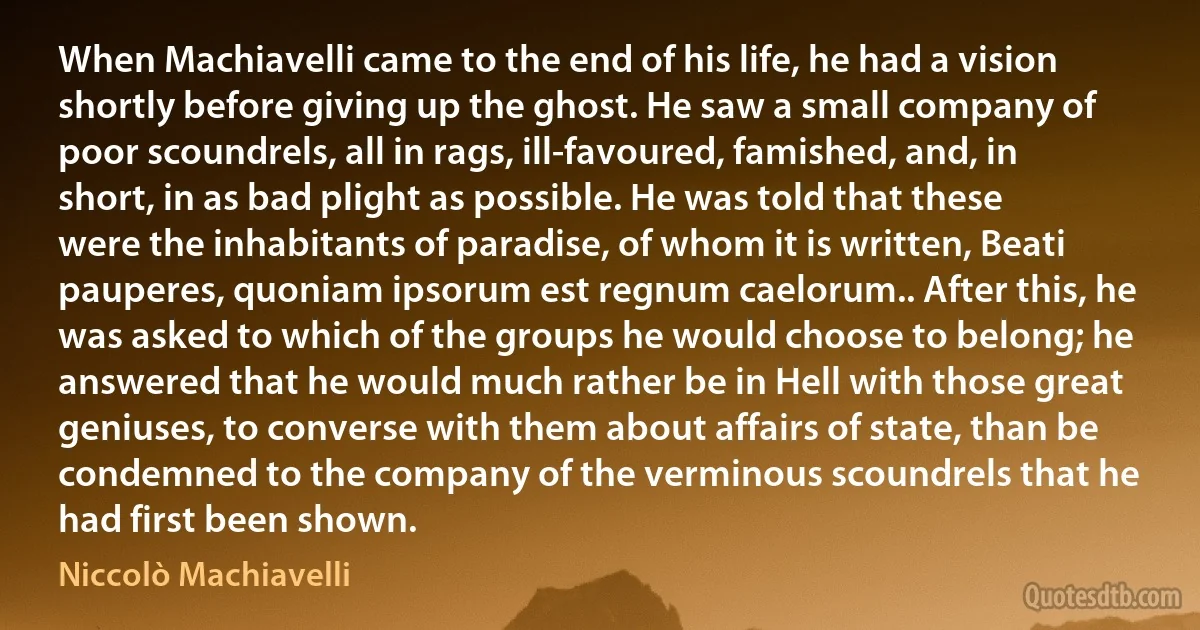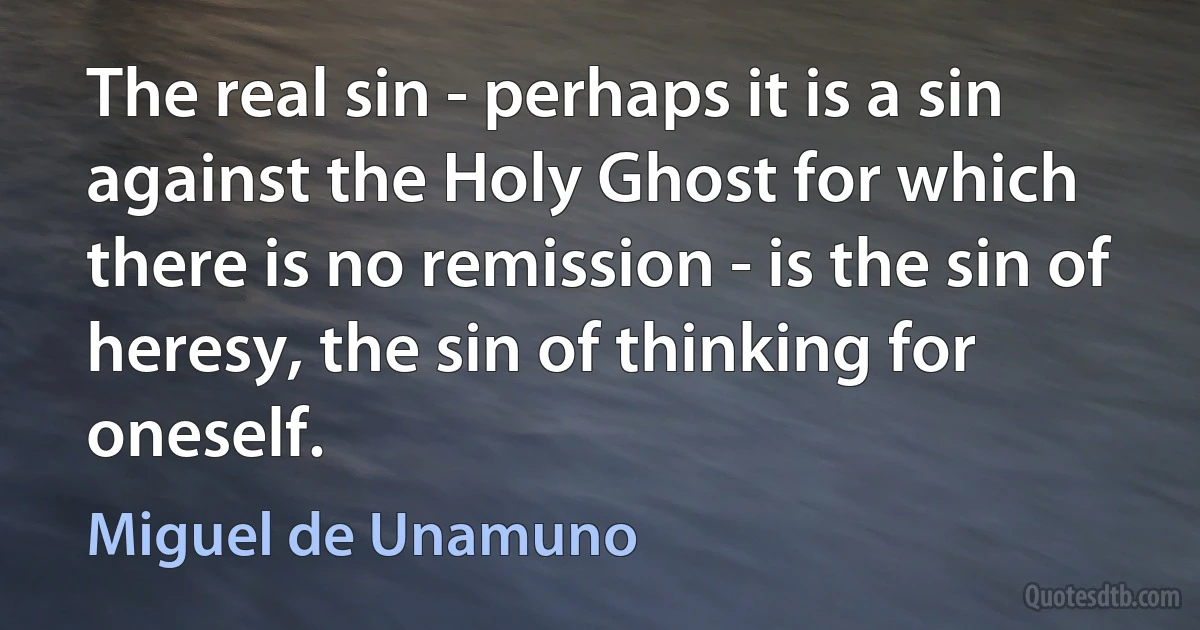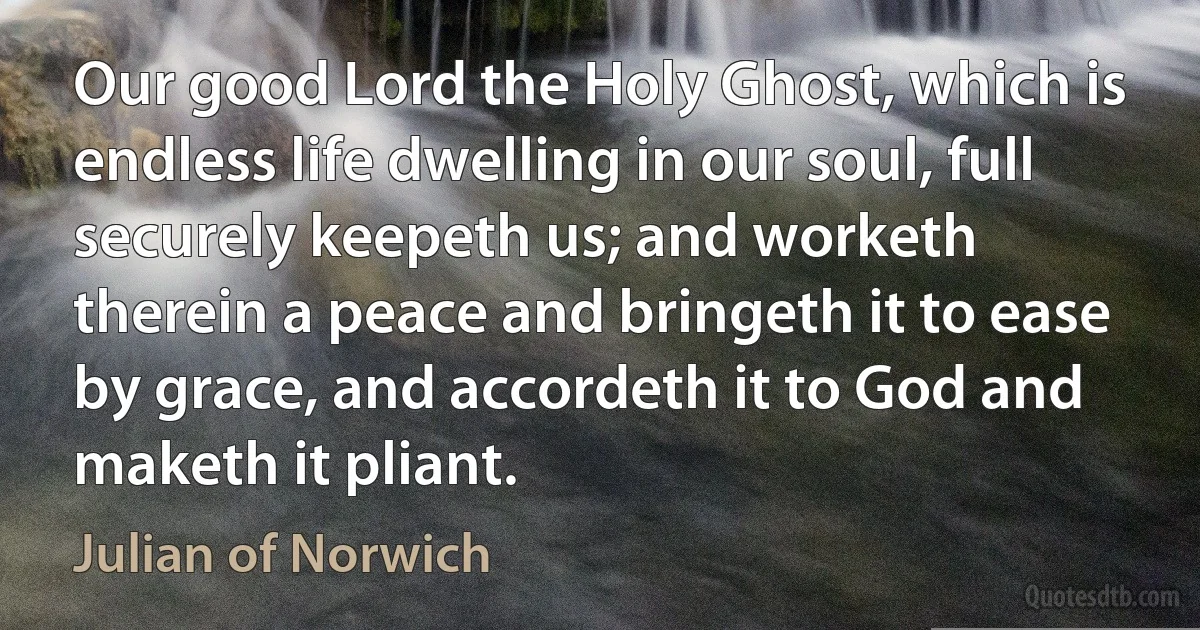Ghost Quotes - page 14
When Machiavelli came to the end of his life, he had a vision shortly before giving up the ghost. He saw a small company of poor scoundrels, all in rags, ill-favoured, famished, and, in short, in as bad plight as possible. He was told that these were the inhabitants of paradise, of whom it is written, Beati pauperes, quoniam ipsorum est regnum caelorum.

Niccolò Machiavelli
Schumann's Kreisleriana: No other cycle among Schumann's great works so perfectly expresses the sensation of dark nocturnal things, of chaos, lurking in the background. The last piece of this collection shows this particularly well. Like skeletons on horseback, shadowy figures flit before us in a soft, sustained rhythm; in the middle section horn-calls enliven the scene with visions of knightly strength and nobility, but at the end the figures vanish ghost - like into night and mystery. Looking into the first volume of Schumann's diaries we find ‘Midnight Piece,' a prose passage which provides moving, indeed alarming evidence of his perilously depressive mental state. It contains elements of a highly personal kind which memorably convey the particular quality of his imagination, mortally cold and never far from visions of death. It could have served perfectly as a model for the final, disturbing piece in the Kreisleriana set.

Burkard Schliessmann
Lacan conceives the difference between the two deaths as the difference being real (biological) death and its symbolization, the settling of accounts the accomplishment of symbolic destiny (deathbed confession in Catholicism, for example). This gap can be filled in various ways; it can contain either sublime beauty or fearsome monsters: in Antigone's case, her symbolic death, her exclusion from the symbolic community of the city, precedes her actual death and imbues her character with sublime beauty, whereas the ghost of Hamlet's father represents the opposite case, - actual death unaccompanied by symbolic death, without a settling of accounts - which is why he returns as a frightful apparition until his debt has been repaid. This place between the two deaths, a place of sublime beauty as well as terrifying monsters, is the site of das Ding, of the real-traumatic Kernel in the midst of symbolic order.

Slavoj Žižek
The American white man (not to speak of the Indian, the Negro, the Mexican) hasn't a ghost of a chance. If he has any talent he's doomed to have it crushed one way or another. The American way is to seduce a man by bribery and make a prostitute of him. Or else to ignore him, starve him into submission and make a hack of him.

Henry Miller
I was standing outside myself trying to stop those hangings with ghost fingers... I am a ghost wanting what every ghost wants-a body-after the Long Time moving through odorless alleys of space where no life is, only the colorless no smell of death...Nobody can breath and smell it through pink convolutions of gristle laced with crystal snot, time shit and black blood filters of flesh.

William S. Burroughs
In the Book of Hermes, "Pimander," is enunciated in distinct and unequivocal sentences, the whole trinitarian dogma accepted by the Christians. "The light is me," says Pimander, the DIVINE THOUGHT. "I am the nous or intelligence, and I am thy god, and I am far older than the human principle which escapes from the shadow. I am the germ of thought, the resplendent WORD, the SON of GOD. Think that what thus sees and hears in thee, is the Verbum of the Master, it is the Thought, which is God the Father... The celestial ocean, the AETHER, which flows from east to west, is the Breath of the Father, the life-giving Principle, the HOLY GHOST!"

Helena Petrovna Blavatsky
It is neither possible nor desirable to make all men think alike. Variety is the very basis of harmony; and, in the sphere of ecclesiastical experience, oneness of feeling is vastly preferable to unanimity of belief. The voice of God, however, as uttered in the events and experiences of the past hundred years, enjoins upon the private membership of the church the culture of that "unity of the Spirit " which is begotten of the Holy Ghost, and which derives from its Divine Author the life in which it resides, the elements of which it is composed, and the impulses under which it acts.

John McClellan Holmes
I hear you reproach, 'But delay was best, For their end was a crime.' Oh, a crime will do As well, I reply, to serve for a test As a virtue golden through and through, Sufficient to vindicate itself And prove its worth at a moment's view ...... Let a man contend to the uttermost For his life's set prize, be it what it will The counter our lovers staked was lost As surely as if it were lawful coin And the sin I impute to each frustrate ghost Isthe unlit lamp and the ungirt loin, Though the end in sight was a vice, I say.

Robert Browning
Our faith is a Virtue that cometh of our Nature-Substance into our Sense-soul by the Holy Ghost; in which all our virtues come to us: for without that, no man may receive virtue. For it is nought else but a right understanding, with true belief, and sure trust, of our Being: that we are in God, and God in us, Whom we see not.

Julian of Norwich
I speak but little of reverent dread, for I hope it may be seen in this matter aforesaid. But well I wot our Lord shewed me no souls but those that dread Him. For well I wot the soul that truly taketh the teaching of the Holy Ghost, it hateth more sin for vileness and horribleness than it doth all the pain that is in hell.

Julian of Norwich
For all heavenly, and all earthly things that belong to Heaven, are comprehended in these two dooms. And the more understanding, by the gracious leading of the Holy Ghost, that we have of these two dooms, the more we shall see and know our failings. And ever the more that we see them, the more, of nature, by grace, we shall long to be fulfilled of endless joy and bliss. For we are made thereto, and our Nature-Substance is now blissful in God, and hath been since it was made, and shall be without end.

Julian of Norwich



